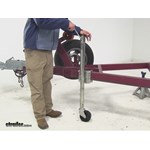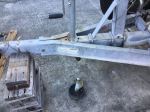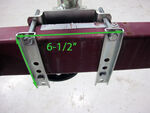Fulton Boat Trailer Jack w/ Wheel - Sidewind - Fixed Mount - 15" Lift - Zinc - 1.2K
- All Info
- Reviews (1737)
- Q & A (0)
- Photos
Fulton Trailer Jack
- Boat Trailer
- Enclosed Trailer
- Utility Trailer
- 1001 - 2000 lbs
- Manual Jack
- Bolt-On
- Side-Mount Jacks
- With Wheel
- 15 Inch Lift
- Fulton
- Marine Grade
This jack offers premium rust protection, plus it's a great alternative to swing-up jacks if you have clearance issues along your trailer frame. Wheel swivels 360 degrees. Zinc finish has a 600-hour salt spray rating, great for coastal areas.
Features:
- Supports, lifts, and lowers your boat or recreational trailer
- Fits great on trailers with short or cluttered tongues where a swing-up jack is a no-go
- Makes it easy to move your trailer in tight spaces
- Caster turns a full 360 degrees
- Resists rust and corrosion, even in areas with salt
- Premium Z-Max zinc coating has a 600-hour salt spray rating
- Lasts for years thanks to durable steel construction
- Avoids winch posts, tool boxes or other accessories mounted on your trailer
- Sidewind handle lets you crank jack without your hand getting smashed
- Incorporates a grease zerk for easy maintenance
- No need to remove and re-lubricate gears
- Bolts around trailer frame
- Includes mounting bracket and hardware
Specs:
- Application: trailer frames up to 3" wide x 5" tall
- Lift capacity: 1,200 lbs
- Bracket height:
- Retracted: 9"
- Extended: 24"
- Screw travel : 15"
- Clearance: 18" from mounting bracket to top of jack
- Inner tube diameter: 2"
- Outer tube diameter: 2-1/4"
- Overall height: 29"
- Wheel diameter: 6"
- Limited 3-year warranty
Built for Setups That Make a Swivel Jack Impractical to Use
Most boat trailer jacks are designed so that you can stow them parallel to your tongue when you're towing. But what if you have accessories (for example, a tool box) that severely limit how much space you have to work with along your trailer frame?

This Fulton jack works around that problem by retracting further up so it doesn't have to swing up out of the way to give you the clearance you need. That being said, the overall bracket height on this jack (distance from the top of your trailer tongue to the bottom of the wheel) is still 9", so double check your ground clearance to make sure that the wheel won't be dragging on the ground while you're towing.
Excellent Corrosion Resistance
The simple truth is that salt can be highly corrosive to metal when exposure lasts for an extended period of time. So, the more you tow around it, the more you need to protect your trailer from it.

The Z-Max zinc finish on this jack offers great corrosion protection, even with occasional use around saltwater, to help ensure that it doesn't end up looking like the one pictured above. Rust-resistant coatings are graded according to a salt spray rating. Basically, this rating shows the amount of time it takes for a material to show signs of corrosion when exposed to pure, continuous salt spray. Traditional zinc plating typically begins to deteriorate after about 100 hours. Dacromet usually lasts for around 300 to 400 hours. Fulton's Z-Max finish lasts for 600 hours in the salt spray test - 30% longer than a standard powder coat finish.
The environment this test creates is much harsher than anything you'll ever experience in your journeys, but it provides a testament to how well this jack resists rust and corrosion.
How to Determine the Lift Capacity You Need in a Jack
A trailer jack lifts your trailer high enough at the tongue to allow you to couple it with your vehicle. Usually, your tongue weight is about 10-15% of your gross trailer weight (GTW). For example, a 10,000-lb trailer has a tongue weight of 1,000 lbs to 1,500 lbs. To raise the tongue of a trailer this size, you'd need a jack that can handle a static load of no less than 1,500 lbs. And, yes, it's okay to have a jack with a weight rating that is higher than your trailer's tongue weight. In fact, a jack with a higher capacity should operate more efficiently, allowing you to spend less time cranking and more time fishing.
TJ12220301 Fulton Trailer Jack - Fixed Mount - Bolt On - Sidewind - 15" Travel - 1,200 lbs
Replaces XPF15L0101
California residents: click here
Customer Satisfaction Score:
90% were satisfied with this product
10% of customers were not satisfied
- Arrived Damaged
- Product did not meet expectations
- Wrong item was ordered
Ratings & Reviews
4.8
1732 reviews
Product was exactly what i needed.
Good product
See what our Experts say about this Fulton Trailer Jack
- Do You Offer Fix Mounted Trailer JacksYes, we do offer a variety of fixed mount jacks like the Fulton Fixed-Mount Marine Jack - Sidewind - 1,200 lbs, part # TJ12220301. I have attached a weblink to our fixed mount trailer jacks and a video demo link below.
view full answer... - Trailer Jack Recommendation with Short Distance from Mounting Bracket to Bottom of WheelFrom the center of the mounting bracket down to the bottom of the wheel of the Dutton Lainson Jack part # DL22300 that you referenced measures 13 inches. Another low option is Fulton fixed jack # TJ12220301. This jack measures a mere 9 inches from the center of the mounting bracket to the bottom of the wheel. But it does not swivel.
view full answer... - Availability of Trailer Jack With Wheel and Has the Highest LiftThe trailer tongue jack that will have the most lift would be the Bulldog Rack-and-Gear Jack with Steel Wheel, part # BD165412. The jack is designed to fit A-Frame trailers and has a maximum lift of 19 inches. This jack has a lift capacity of 1,200 lbs. This jack was designed for use on trailers being towed by large 4x4 trucks. The next highest lift would be 16 inches. I am including a link to a product page that will show the choices of jacks I would have in the 16 inch lift. The Fulton...
view full answer... - Options For A Tongue Jack With Low Retracted Height For An ATV TrailerHello George. I believe I understand what you are describing. I really cannot recommend modifying a jack in the way you described though. If you need something with a retracted height of less than 10-1/2" we do have a few options for you. One is the Square Jack w/ Footplate # MJSQ-2500B. This jack has a 7-1/4" retracted height. As far at the bolt on tongue jacks we offer, this will have the lowest clearance of all of them. The only downside is that this jack has a footplate and not a wheel....
view full answer... - Recommended 1,500 Lb Non-Swivel Tongue JackYes, we have the etrailer Square Jack w/ Footplate - Drop Leg - Bolt On - Zinc - Sidewind - 29-1/8" Lift - 2.5K # MJSQ-2500B that has a 2,500 lb capacity, and a total lift of 29-1/8", and does not have a swivel feature. The next closest option we have is the Fulton Fixed-Mount Marine Jack part # TJ12220301 which has a 1,200 lb capacity, can extend up to 15", and does not have a swivel feature. These will be the best options that we have to replace the Fulton XLT Bolt-Thru Swivel Trailer...
view full answer... - Can A Swivel Jack Be Used On the Side Of An A-Frame Boat TrailerThe ideal placement of a tongue jack on an a-frame trailer is indeed as close to the trailer coupler as possible. That said, there are others with the very same issue you have and they use a swivel mount jack on the a-frame portion just a bit further away from the tongue without issue. Personally, I would use the Fulton Fixed-Mount Marine Jack part # TJ12220301 on the straight portion of the tongue as it appears you have enough room for this but a swivel mount jack like the Fulton Round,...
view full answer... - Width of Mounting Bracket for 1.2K Fulton Fixed-Mount Marine JackThe mounting bracket for the Fulton Fixed-Mount Marine Jack # TJ12220301 measures 6-1/2" x 6-1/2" so it will take up 6-1/2" of your trailer tongue frame.
view full answer... - Solution to Replace Caster Wheel on Jack with 2 Inch Diameter TubeI can't say that I recommend drilling another hole in the jack tube since it's going to further weaken the steel tubing the more holes are drilled in it, but you may be able to make the Replacement Caster Wheel for Ultra-Fab Manual 2" Trailer Jack # UF49-954035 as it has a 1-3/4" diameter to connect to the 2" tube on your jack. With that said, your best bet is probably just to replace the jack altogether with something like the Fulton Fixed-Mount Marine Jack - Sidewind - 1,200 lbs # TJ12220301...
view full answer... - Which Trailer Jack Do I Need for My 1994 Mastercraft Boat TrailerWe do have some options for you, however we do not have anything that matches the bolt pattern of your current jack plate. Instead of trying to match the bolt pattern of the welded plate you can get a bolt-on jack that uses U-bolts to connect to the trailer. Which jack you need will depend on the weight capacity and height of your current jack. You'll also want to make sure the U-bolts will fit around the trailer frame. I've linked our selection of bolt-on jacks for you. A few examples...
view full answer... - Recommended Side Frame Mount Trailer Jack for Cycle TrailerFor your small cycle trailer, I recommend looking at the Fulton Fixed-Mount Jack # TJ12220301. This is a very nice side frame mount jack that will be your best option for what you are needing. This jack features 15 inches of lift and can be clamped around the trailer frame with the included hardware. The sidewind handle will be great for your limited clearance and the steel caster wheel will allow you to move the trailer around. You will just want to make sure the 1,200 pound lift capacity...
view full answer... - Replacing Standard Snap Ring Swivel Jack, Or Upgraded Fulton F2 JackThe easiest solution is to replace your broken jack with something like the Fulton # FTJ120W0301. This is the same design as what you have and will support 1200 pounds of tongue weight and provide 10 inches of lift. All of the other styles of jacks require cutting off the existing flange and bolting around or through the frame to attach with U-bolts. If you are interested in going that route you can use the F2 jack # F1413140334 which is heavier duty supporting 1600 pounds of tongue weight,...
view full answer... - What Is Mounting Bracket Dimensions of Fulton Trailer Jack # TJ12220301The mounting bolt pattern of the Fulton Jack # TJ12220301 is 5-1/2 inches left to right and then vertically the mounting holes can fit trailer frames between 3 inch and 5 inches tall.
view full answer... - Boat Trailer Tongue Weight Compatibility with Fulton 1,200 lb JackThe Fulton Fixed-Mount Marine Jack - Sidewind - 1,200 lbs # TJ12220301 is rated for tongue weights up to that capacity. Trailers typically have a tongue weight of between 10 and 15 percent of the total weight so this will work very well for you. If you want to know your exact tongue weight you can use a scale like # e99044.
view full answer... - Swivel Trailer Jack with Bracket Height Under 12 InchesRack and gear jacks like # BD169201 can get low with a bracket height when retracted of only 8 inches. But rack and gear jacks are low capacity, 750 pounds, and do not swivel. Another low option is Fulton fixed jack # TJ12220301 which can actually get lower than even a rack and gear jack. This jack measures a mere 9 inches from the center of the mounting bracket to the bottom of the wheel. But it does not swivel. The lowest I can get on a swivel jack with a wheel is 12-3/4 inches like...
view full answer... - Availability of Replacement Mounting Hardware for Fulton Fixed Marine Jack # TJ12220301Replacement mounting hardware for Fulton marine jacks is available in a kit consisting of 2 brackets, 4 bolts and 4 nuts. These are available together as part # F500286. A link to this item is provided.
view full answer... - How Much Lift Does Fulton TJ12220301 Trailer Jack ProvideThe lift of a trailer jack is the height difference between it's retracted length and its length when fully extended. When fully retracted, the mounting bracket of the jack will sit about 9 inches above the bottom of the caster wheel. When fully extended, the bracket will be about 24 inches above the bottom of the caster wheel, so it'll work just fine for a trailer ball height of 15 inches. If you click the provided link, you can see a video where my buddy Randy demonstrates the Fulton...
view full answer...
Do you have a question about this Trailer Jack?
Info for this part was:









At etrailer we provide the best information available about the products we sell. We take the quality of our information seriously so that you can get the right part the first time. Let us know if anything is missing or if you have any questions.












































Thank you! Your comment has been submitted successfully. You should be able to view your question/comment here within a few days.
Error submitting comment. Please try again momentarily.